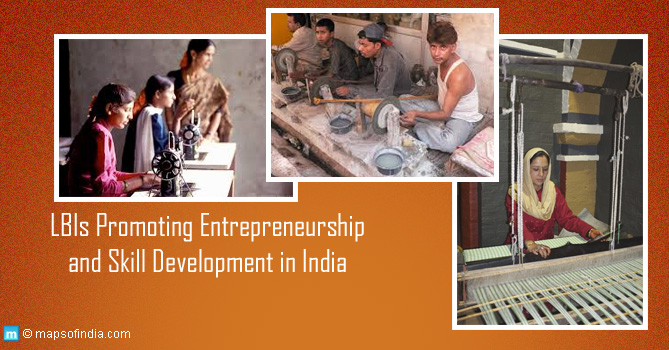Prime Minister Narendra Modi, on taking office had spoken about the potential for entrepreneurship amongst the rural youth that lay untapped on account of lack of knowledge, training, resources and guidance. He spoke on how India could emerge as a strong self-reliant nation and significantly increase the GDP by unleashing the power of entrepreneurship, with support and encouragement from the government, private sector, NGOs and other related agencies.
His vision was translated into a plan by introducing the scheme of ‘Livelihood Business Incubators’, with a corpus fund Rs 200 crore, being announced by the Finance Minister Shri Arun Jaitley, in his Budget Speech of FY’14-’15. That call to action was formally launched on March 18, 2015 as a ‘Scheme for Promotion of Innovation, Entrepreneurship and Agro Industry’, by the Union Minister of Micro, Small and Medium Enterprises, Shri Kalraj Mishra.
India’s Vast Untapped Potential
Through five decades, India’s MSME sector has been slowly and steadily growing and today, the sector contributes nearly 8% to the GDP. The importance of the sector can be seen by the fact that MSMEs contribute nearly 45% of the manufacturing output and holds a share of 40% of the total exports.
The fourth All India Census revealed that there were 361.76 lakh units operating MSMEs, of which 15.64 lakh were registered units, and collectively employed 805.24 lakh persons. The government plans to raise the manufacturing share of the GDP from 16% to 25% by 2022, which will help in creating 100 million jobs for urban and rural youth.
While this may seem ambitious, there is a large segment of youth that has not had the opportunity thus far to access various schemes and benefits and therefore, their talent for entrepreneurship could not be realised. In order to bring them under a planned and coordinated program, the Government of India has launched ‘Livelihood Business Incubators’ (LBI) with special focus on rural India, which is in line with the larger ‘Make in India’ initiative of the government.
Can LBIs Emerge As A Game Changer?
The ultimate objective of setting up LBIs is to assist in creating jobs at the local level and reduce unemployment. Unlike several other government-sponsored programs launched earlier, which operated in silos, the LBI initiative is a well-thought program that has recognised the limitations and problems that were holding back the youth from becoming successful entrepreneurs. The hurdles were several.
Firstly, there was very little awareness of various government programs and benefits. While most programs offered small financial assistance, there was very little post-finance hand holding or mentoring given to the inexperienced youth. The ones that did try and become entrepreneurs had little or no training, nor did they have knowledge or access to suitable tools or equipment for their respective businesses. Due to this, most struggled in the early phase of launching their business, which also happens to be the most difficult period, and subsequently ran up losses and were forced to shut their businesses.
Thanks to the spread of mobile phones and the Internet, information on current opportunities is now available in real time to all and is further stoking aspiration for a better life amongst those who remained excluded from the benefits of urban opportunities. The LBI program is designed to harness this aspiration by providing all the needed inputs, including training, finance and guidance to succeed in any enterprise that they choose based on their interest and aptitude.
Objective of LBIs
The LBI initiative is an excellent program with a clear mandate and a targeted timeline. The program envisages encouraging innovation and entrepreneurship through the following framework:
- Setting up a network of incubation centres and providing all necessary support for establishing Livelihood Business Incubation Centres and Technology Incubation Centres and tapping potential at the grass root level.
- Undertaking capacity building measures through engagement of specialised consultants, conducting surveys, organizing site visits, undertaking relevant studies and organizing workshops.
- Developing accelerator workshops.
- Establishing a start-up fund that will be managed by SIDBI.
The Plan
The government plans to get organisations like the National Small Industries Corporation (NSIC), Khadi and Village Industries Corporation (KVIC), Coir Board and similar agencies, to adopt the ‘Rapid Incubation Model’ that synergises entrepreneurship and skill development with ‘live’ demo projects.
Encourage and involve private sector participation under the PPP model in coordination with any of the above mentioned institutions or agencies.
The government has set up clear timeline and fund allocation for setting up the LBIs. 10 LBIs were proposed under the FY ’14-’15 with a fund allocation of Rs. 10 crore, 30 LBIs by FY ’15-‘16 with a fund allocation of Rs. 22.50 crore, and 40 LBIs by FY ’16-’17 with Rs. 30 crore. A total of 80 LBIs is planned with a total fund allocation of Rs. 62.50 crore. Each LBI will have 800 trainees per centre with a total number of incubates touching 1,04,000 for taking the program forward.
The funding pattern will be as follows:
- Rs. 2 crore for creation and maintenance of database of the Technology Incubation Centres.
- Rs. 17.75 crore for capacity building including workshops, surveys, studies, consultants and evaluations.
- Rs. 62.50 crore for setting up the Incubation Centre infrastructure by NSIC, KVIC, Coir Board and other similar agencies.
- Rs. 61.50 crore for setting up Technology Incubation Centres.
- Rs. 6.25 crore towards administrative costs.
- Rs. 60 crore for start-up that will be managed by SIDBI.
- Total allocation of Rs. 210 crore.
- Government sets up high-powered committee to monitor the program.
The government has announced the setting up of a Scheme Steering Committee that will be chaired by the Secretary, the Ministry of MSME and Secretary level members drawn from the Ministry of MSME, Agriculture, Rural Development, Food Processing, Agriculture, Biotechnology, Information Technology, DIPP, Labour and Employment, Director General CSIR, CMDs of NSIC and SIDBI.
The steering committee will ensure a coordinated approach between stakeholder ministries and oversee the overall performance metrics as the program proceeds further.
The youth must come forward to participate in this initiative.
With the central government offering all necessary support and hand holding from training to production, the youth must respond positively and enroll with the respective LBIs that are being planned. With one of the youngest populations in the world, India is well-poised to accelerate the pace of development and it’s for the youth to now come forward and join this vast opportunity for entrepreneurial growth.
For further information: please visit www.msme.gov.in
Read More Information
MUDRA Bank Yojana
Pradhan Mantri Jeevan Jyoti Bima Yojana (PMJJBY)
Pradhan Mantri Suraksha Bima Yojana (PMSBY)
Sukanya Samriddhi Account
Pradhan Mantri Kaushal Vikas Yojana
Pradhan Mantri Krishi Sinchai Yojana
Pradhan Mantri Awas Yojana (PMAY)
One Rank One Pension Scheme
Seventh Pay Commission
Schemes of Ministry of Micro, Small and Medium Enterprises (MSME)
Garib Kalyan Yojnaye
All Information about Digital India Programme
DigiLocker
eBasta – Features and Benefit for students
Atal Mission for Rejuvenation and Urban Transformation
Mahatma Gandhi National Rural Employment Guarantee Act (MGNREGA)
Beti Bachao, Beti Padhao Scheme
Pahal Scheme
Jan Dhan Yojana
Skill India
Modi’s Sagar Mala Project






